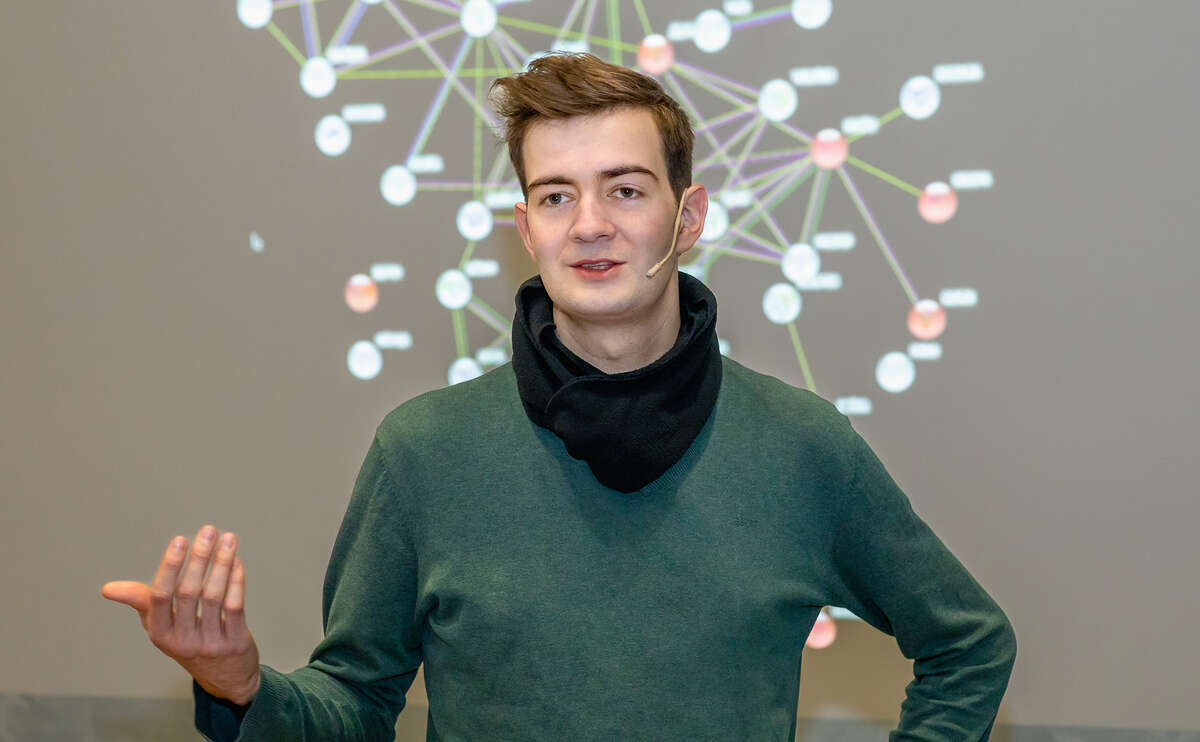Interview with Chris Peyer
At first he was surprised. He had imagined that studying biology would be different. It not only deals with the human being. On the contrary, it is exactly the broad range of fields, which he now finds fascinating. He chose molecular biology, not only because he really enjoys the practical work in the lab but also because it is a very relevant area with a lot of potential.

Why did you decide to study biology?
After finishing school, I was torn between studying medicine, math or biology. Since I did not pass the entrance exam for medicine, this was no longer an option. In retrospect, this turned out to be a stroke of luck for me, as I very much enjoy biology. Especially, because of the wide range of topics and because it does not only revolve around the human being. That’s why I didn’t try again the medicine exam, like many others do (he laughs).
How was your first year at university?
I was very surprised at how much math, physics and chemistry we had in the first year. That’s not what you would associate with biology because what you learn in Gymnasium somehow raises false expectations, as you learn a great deal about human beings. But I liked it. Math had been one of my study options and with physics and chemistry you practically start from scratch. That was a real opportunity for me. Looking back, I have to admit that these subjects are extremely important for studying molecular biology.
In the first years you can also take elective subjects. Which did you choose?
I really got into it. Amongst others, I attended lectures on psychology, the 9/11 incident and on the Basel carnival. The range offered is extremely varied and exciting. Everyone can find things that interest them. I can highly recommend forensic genetics. It’s very interesting, especially for biologists.
The first two years of study used to be very theoretical. Now there is a new Experimental Molecular Biology course. How did you like it?
This was a very positive experience. It does take up a lot of time. During the whole of the second year you work for two afternoons a week in the lab. However, these hours just fly by and, for the first time, I really felt like a biologist. You start to put the learnt theory into practice and to learn all the technical skills and different methods that you need in the lab. It was really fun and apart from lab work it also showed you what the daily bread of a molecular biologist is.
Can you explain that a bit more?
We also learnt, for example, to make presentations. During the first semester we read a book together and each week someone presented a chapter. In the second semester, as a group activity, we analyzed our research findings and learnt how to break this down to the essentials and then to present them. Furthermore, we also read many scientific articles and learnt to think like a scientist.
The third year at the Biozentrum is also practice oriented. How does it differ from the second year?
In the second year, you actually work on one topic and learn the fundamentals, so to speak. In the third year, you attend three, six-week, whole-day block courses on specific areas such as Structural Biology, Microbiology and Immunology or Developmental Biology. Each week a different lab presents a topic and introduces us to a project, and so you begin to delve into different fields.
And how is the team spirit among the students?
In these practice-oriented courses, it feels like being in one large school class, only better, because everyone shares the same interest (he laughs).
You chose the field of Molecular Biology. Why?
I loved the idea of working in a lab. Also working very precisely and with the smallest details, as well as the many theoretical, mathematical and chemical aspects, appeals to me very much. And, of course, I also explored what I could do with his later. Molecular biology is an incredibly relevant field, with new opportunities opening up all the time. I am thinking, for example, of genetics or viruses, which will come up again and again. Corona has just shown us its great potential once again.
You have now started your masters. How did you choose your research group and your topic?
That was something super about the block course. You get to have an insight into many research groups and are introduced to many subjects. So, if you are interested in a topic and you like the research group, it is a good opportunity to ask about the possibilities. I think, it is very important to speak with many different people and to keep in mind that asking costs nothing. The block courses were a great help with this. Beforehand, I didn’t know which direction really interested me.
Do you have a tip for students who are just starting out?
As I said, asking is always a good thing. You also get a buddy with whom you can really freely speak about your thoughts and concerns. Then, I also think it is important not to underestimate your studies. Biology is a demanding degree. It is perfectly manageable but you should not take it lightly. And especially for those who are not from Basel, I can really recommend that you take advantage of the many university offers, such as Unisport or the University Choir. There you quickly get to know many people. I sing in the choir, and it is great fun.


